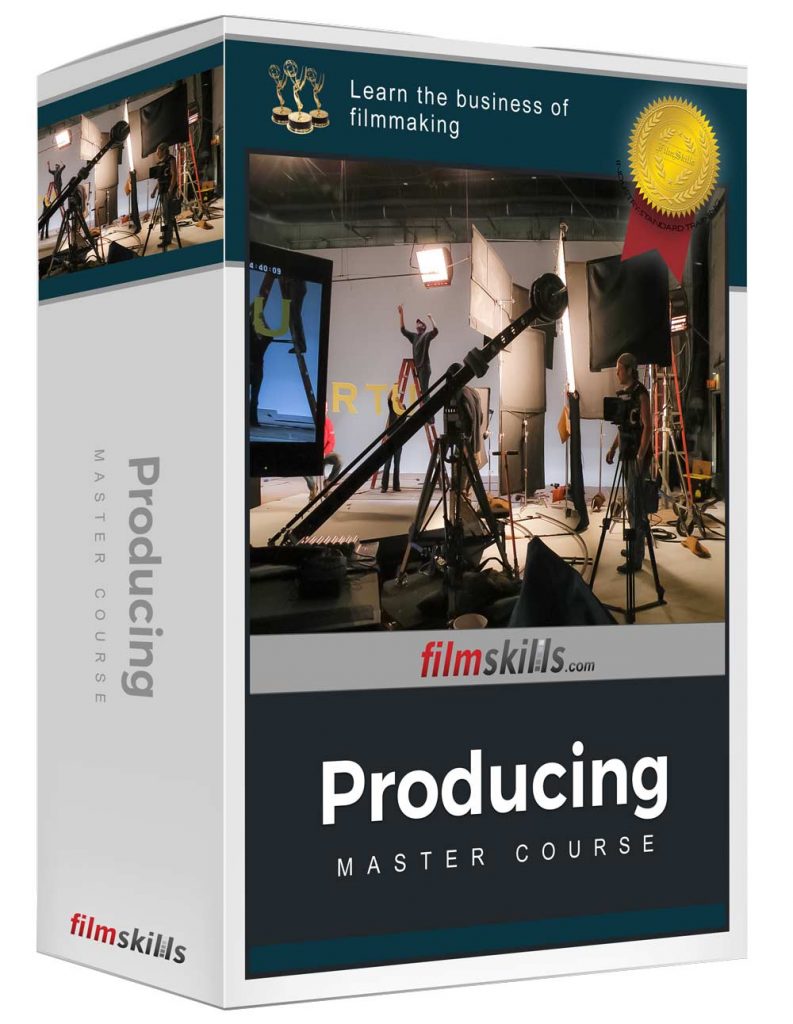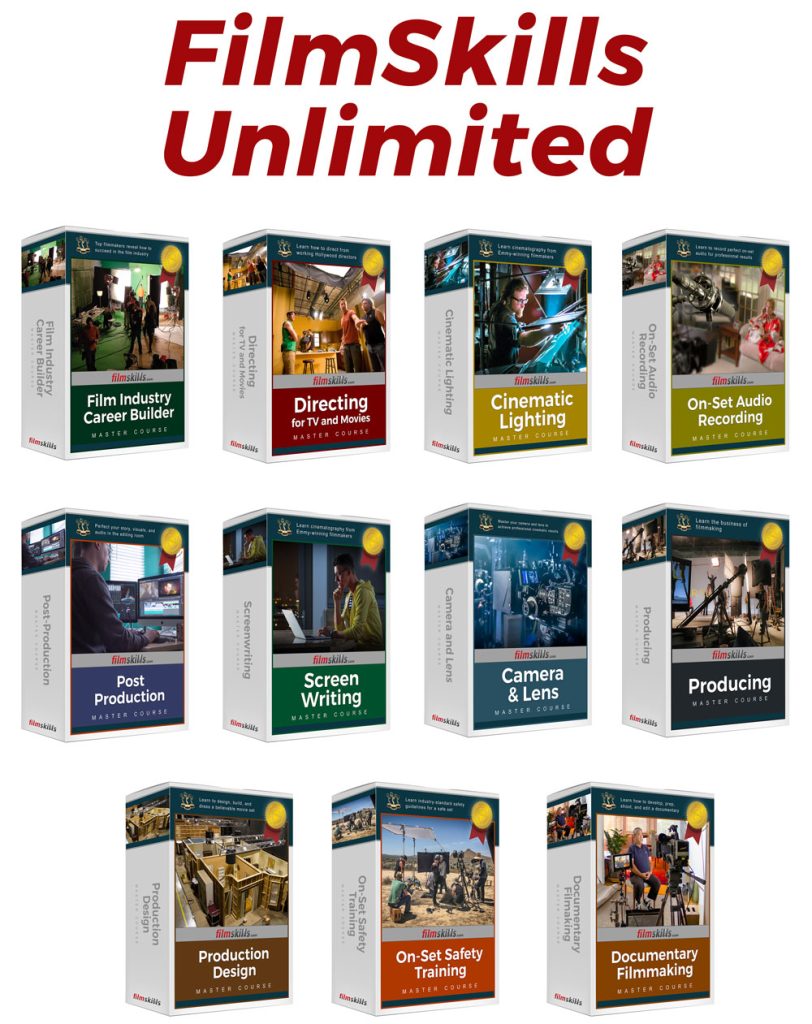The Complete Filmmaking Curriculum
Over a hundred Hollywood professionals helped build a comprehensive filmmaking curriculum.

Marketing and Distribution
From the birth of an idea to the green light, this series takes you inside the writing process, and teaches the complete process of writing a feature-length screenplay.
Section 1: Film Marketing
Professional Hollywood marketers from both the studios and independent world teach students how to effectively market their movies to investors, audiences, and distributors.
Film Marketing
Film marketing is the other half of a Hollywood movie’s budget. The cost of reaching an audience and getting them interested in seeing a specific title is an art and a science. In this lesson, you will learn how the film marketing machine in Hollywood works and how you can use it to market your movie. (15:41)
Reaching Your Audience
Before you can start building a marketing campaign, you have to know who your audience is. Every image, every color, every word, and every place you put your ads need to be strategically chosen to speak to the audience you want to attract. This is Marketing 101 - and it’s often the most overlooked part of a marketing campaign. In this lesson, we will show you how to determine your audience to craft the perfect marketing campaign for the best results. (26:05)
Designing the Key Art
First impressions, as the old cliché goes, are lasting. This couldn’t be more true than when talking about the movie poster. The movie poster is only one component of the marketing campaign and relies heavily on the “key art” for the film. Key art is the visual motif that defines the entire marketing look and feel, including images, fonts, and the color palette. The key art is used everywhere from social media ads to movie posters and is the first and most important marketing tool in gaining the interest of audience members, distributors and producers. In this module, you will learn techniques for designing effective key art. (16:11)
Making a Movie Trailer
The movie trailer is the most important marketing tool you have to sell your movie. Distributors have made deals on the trailer alone, which makes the look and feel of the trailer even more important than the movie itself. In this module, you will learn tips and techniques for creating an engaging trailer to properly represent your film. (27:23)
Building Your Website
One of the least expensive, yet most effective ways of marketing your movie is to set up a website. While you can make it as elaborate as you like, always think about the audience for the site - moviegoers who may want to see the film or distributors you are courting to buy the film. In this module, you will learn how to properly craft an effective site to market your movie. (5:43)
Building a Press Kit
When approaching television, radio, and newspapers to do a story about your movie, they will ask for a press release or an electronic press kit (EPK). This EPK provides journalists a variety of useful information, quotes, and photographs they can use to quickly and easily compose the story. In this module, you will learn how to craft an EPK for your film. (13:35)
Working with the Media
The film industry is more about marketing that it is about film production. The studios often spend more money on advertising, publicity and marketing than they do on producing the movie itself. While the same holds true in the independent filmmaking arena, few filmmakers can afford much more than a few hundred posters and a website. That makes media coverage a critical part of your marketing campaign. In this lesson, you will learn how to reach the media, how to conduct an effective interview, and how to get your message across. (17:56)
Section 2: Distribution
Learn how the Hollywood sales machine works from top producers and distributors at film festivals, markets, and online.
Introduction to Distribution
Learn how the distribution process works, the way studios approach the process, the windows and time frames of distribution, how to approach self-distribution, and knowing your audience. Guiding you through these tricky waters are veteran studio executives from LucasFilm, Sony, and FreeMantle Media. (23:35)
Film Ratings and the MPAA
The MPAA is responsible for issuing the ratings we see in a movie - G, PG, PG-13, R, and NC-17. The rating your film receives has a direct impact on the willingness of distributors to pick-up your film, and your film’s revenue potential. In this module, you will learn how the MPAA works, and how you can best prepare for a favorable rating. (14:09)
Domestic Distribution
Making the film is only one part of the process. Selling it is the other. Whereas making the movie has been a stressful process, the game of finding a distributor, negotiating the contracts, preparing the deliverables, and facing the sometimes staggering costs of E&O insurance, conversions, and M&E mixes hit most filmmakers by surprise. In this module, we will prepare you for the distribution process so you know what to expect, what materials are needed, and most importantly how to protect yourself in the high stakes game of film distribution. (24:14)
Foreign Distribution
Learn how foreign sales agents work, how to find a reputable agent, common scams used to steal your movie without paying you, what you will be expected to deliver, how to collect your money, and hundreds of other tips. We take you to the heart of it all at the American Film Market to see – firsthand, how the foreign distribution process works. (37:22)
Film Festivals
We all dream of an extravagant Sundance Film Festival premiere where we are showered with offers from anxious distributors stepping over each other to acquire our films. While this certainly happens, the reality is that film festivals offer much, much more in the way of contacts, self-promotion, and an opportunity to pitch your next project to investors and producers.In this module you will learn how to find a qualified producer’s rep, how to get into top film festivals, what to do once you are accepted, how to attract the right audiences at the screenings, and how to leverage the opportunity for your next production. (26:46)
Mistakes Filmmakers Make at Film Festivals
Getting into a film festival is an exciting accomplishment for any filmmaker, but how do you make the most of the opportunity? By properly positioning yourself and your movie, you can attract the interest of distributors, agents, managers, and producers. But if you don’t, you will have wasted an opportunity to further your career. (30:05)
Internet Distribution
The Internet has become a powerful alternative to traditional distribution outlets for independent filmmakers, but while this option seems alluring, it is fraught with challenges. Finding a voice and an audience online is a long and expensive road, and while the profit margins can be greater, so can the time and effort you put in for those profits. In this module you will learn how to properly distribute your movie online, how content aggregators work, how to find a unique presence online, and how to leverage your online movie to get your next movie deal. (27:26)


